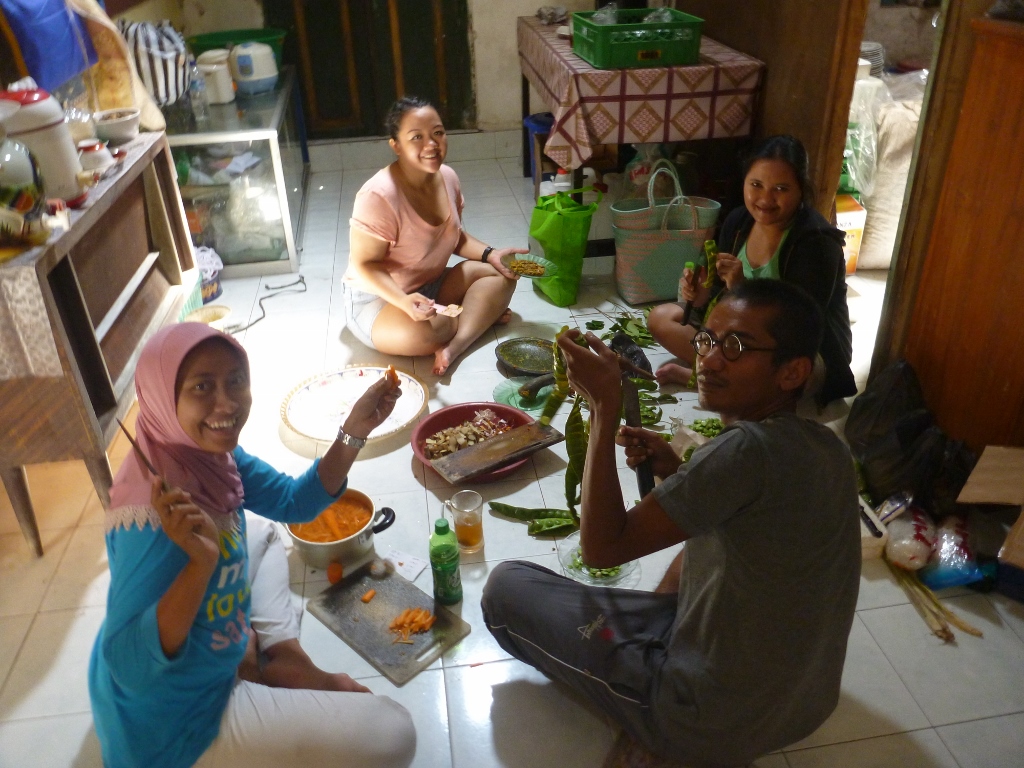Young people in Yogyakarta turn unused urban space into edible gardens
Astrid Reza
 The first ‘blitz’ in the village of Nitiprayan. Local children were involved in making the first edible garden and learning about soil and composting- Paul Daley
The first ‘blitz’ in the village of Nitiprayan. Local children were involved in making the first edible garden and learning about soil and composting- Paul Daley
One day in February 2013 a group of twenty friends came together to transform an empty plot of land in Nitiprayan, a village in the southern part of Yogyakarta, into a garden. Inspired by a permaculture activist from Australia who had recently visited, this group of young people used the principles of permaculture to design and build an edible garden.
Permaculture, the practice of designing self-sustaining agricultural systems, was not something many of the group were familiar with. In fact, most had never done any gardening or farming in their lives. But after a hard day’s work they had planted amaranth, tomatoes, chillies, lemongrass, ginger and turmeric. Within three months, they were harvesting their produce, using it in day-to-day cooking and even sharing it with neighbours.
This event was the beginning of the Permablitz movement in Yogyakarta. Established in Melbourne in 2007, Permablitz is a way of creating community, sharing knowledge about permaculture and sustainable living and producing food at a very local level. A ‘blitz’ involves a group of people working together for a day on a pre-designed garden. Afterwards everyone eats together and plans the next blitz.
Those first involved in Permablitz Jogja were a mix of artists, permaculture designers, NGO workers, students and small-business owners. These people, living in urban areas of Yogyakarta, were not necessarily politically active. Through their participation in Permablitz they have become more aware of issues around food production and distribution in Indonesia. For those who are concerned about introduction of genetically modified foods and use of chemical fertilisers, Permablitz is a way of making sure that what they eat is safe and sustainable. It is a movement that is open to everyone and encourages people to spend time in their own gardens.
The Permablitz movement has slowly spread across Yogyakarta. Recently people in Kalicode and Kaliboyong have become involved. In Kalicode, Permablitz activists worked with young people to build urban vertical gardens. They attracted the attention of older women in the neighbourhood who have now developed more interest in the gardens than their younger counterparts. In Kaliboyong, those most actively involved in making edible gardens are public servants. With little or no experience with gardening or farming, these white-collar workers enjoy being able to grow their own onions and chillies, which have become increasingly expensive to buy from markets.
Permablitz is more than just a means of growing cheap, safe and healthy food. In Yogyakarta it has also become an important way of recreating a sense of community between increasingly isolated people living urban lifestyles. People are attracted to it because of the opportunity it offers to work and eat together. Permablitz Jogja has become a way of reviving the tradition of ‘gotong royong’, but in the context of making an edible garden.
The photos below capture some of the activities that have happened in Yogyakarta over the past year.
 An edible mandala garden at Nitiprayan after three months. This garden now supports the family who owns the land and is even used by neighbours- Paul Daley
An edible mandala garden at Nitiprayan after three months. This garden now supports the family who owns the land and is even used by neighbours- Paul Daley
 Learning how to make compost teabag from fresh cow dung from the farm in Sogan Sleman, using an unused stocking as a strainer and dipping it into water- Astrid Reza
Learning how to make compost teabag from fresh cow dung from the farm in Sogan Sleman, using an unused stocking as a strainer and dipping it into water- Astrid Reza
 Anybody who wants to cook healthy organic food using local ingredients can join the kitchen team, who prepare the food to be eaten after a long day in the garden- Astrid Reza
Anybody who wants to cook healthy organic food using local ingredients can join the kitchen team, who prepare the food to be eaten after a long day in the garden- Astrid Reza
 Permablitz activists prefer to use local materials. Here cow dung from a farm in Sleman is being used in the construction of a garden- Rita Dharani
Permablitz activists prefer to use local materials. Here cow dung from a farm in Sleman is being used in the construction of a garden- Rita Dharani
 Building a raised bed in Sogan, Sleman. Making a raised bed is like making a lasagne. Layers of green compost, brown compost, cow dung and soil are piled on top of each other until the bed is suitably high- Rita Dharani
Building a raised bed in Sogan, Sleman. Making a raised bed is like making a lasagne. Layers of green compost, brown compost, cow dung and soil are piled on top of each other until the bed is suitably high- Rita Dharani
 Setting up a vertical garden in a small yard inside a housing complex in Sleman- Paul Daley
Setting up a vertical garden in a small yard inside a housing complex in Sleman- Paul Daley
 Local bamboo specialist building an installation for seedlings in Sleman- Paul Daley
Local bamboo specialist building an installation for seedlings in Sleman- Paul Daley
 After working all day in the garden, everyone shares a meal made by the kitchen team- Paul Daley
After working all day in the garden, everyone shares a meal made by the kitchen team- Paul Daley
 Permaculture day excursion on May 2013 at Bumi Langit Institute working together with Permablitz Jogja, in Imogiri- Paul Daley
Permaculture day excursion on May 2013 at Bumi Langit Institute working together with Permablitz Jogja, in Imogiri- Paul Daley
 A short talk by Iskandar Waworuntu, one of the first permaculture gardeners in Yogyakarta, on the dangers of GMOs and agricultural chemicals. Iskandar runs Bumi Langit Institute, a centre for permaculture education, in Imogiri (www.bumilangit.org)- Paul Daley
A short talk by Iskandar Waworuntu, one of the first permaculture gardeners in Yogyakarta, on the dangers of GMOs and agricultural chemicals. Iskandar runs Bumi Langit Institute, a centre for permaculture education, in Imogiri (www.bumilangit.org)- Paul Daley
 Using different techniques for watering the garden at the Bumi Langit Institute- Paul Daley
Using different techniques for watering the garden at the Bumi Langit Institute- Paul Daley
 Working with young people in Kalicode to make vertical and edible gardens in an urban area near the river- Rita Dharani
Working with young people in Kalicode to make vertical and edible gardens in an urban area near the river- Rita Dharani
Astrid Reza (astrid.reza@gmail.com) is one of the first people whose garden was ‘blitzed’ in Yogyakarta. For more information about Permablitz Jogja, visit the website [www.permablitzjogja.net], Facebook page [https://www.facebook.com/permablitzjogja] and see a short video [http://vimeo.com/75981266#at=200].











